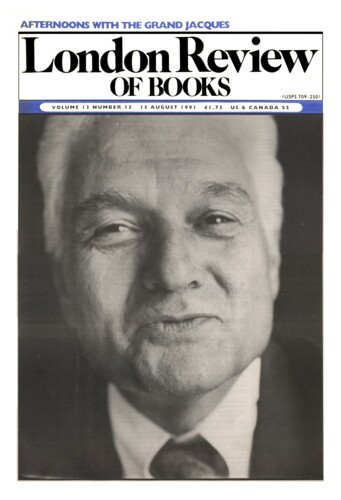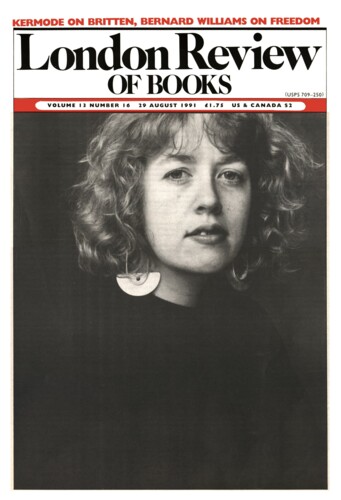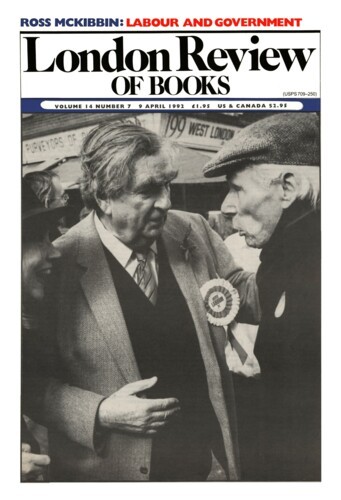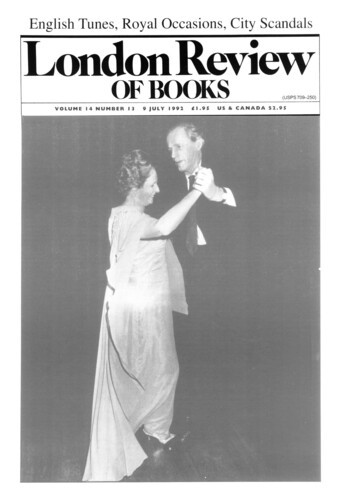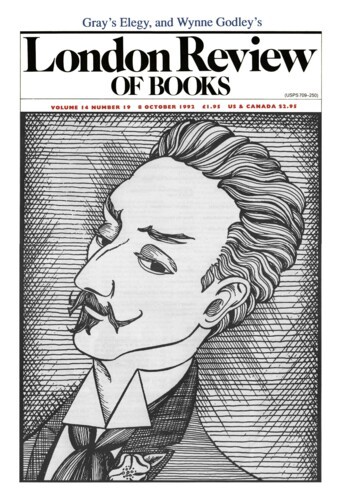John Barrell
John Barrell is an emeritus professor of English at Queen Mary, University of London and an honorary fellow of King’s College, Cambridge and of the British Academy. His books include The Dark Side of the Landscape: The Rural Poor in English Painting, 1730-1840 and The Political Theory of Painting from Reynolds to Hazlitt: The Body of the Public. He edited The Penguin Book of Pastoral Verse and The Complete Writings of William Fox.
Diary: On Allon White
John Barrell, 29 August 1991
The autobiographical fragment by Allon White entitled ‘Too close to the bone’, which was published in 1989 in the London Review of Books, has just been republished by the LRB, this time in book form. Allon taught at the University of Sussex until he died in 1988 at the age of 37. He was the author of The Uses of Obscurity and (with Peter Stallybrass) The Politics and Poetics of Transgression. A collection of fugitive pieces, Carnival, Hysteria and Writing, will be published by Oxford next year with an introduction by Stuart Hall, with whom Allon studied at the Birmingham Centre for Contemporary Cultural Studies.
Back of Beyond
John Barrell, 9 April 1992
‘If one thinks of appearances as a frontier, one might say that painters search for messages which cross the frontier: messages which come from the back of the visible. And this, not because all painters are Platonists, but because they look so hard.’ Throughout this very varied book, and especially when writing on art, John Berger invites us to acknowledge the absolutes and universals which, he insists, lie behind the surfaces of things. He doesn’t have a great deal to say about those absolutes, and asks us to be content with terms like the essential, the invisible, the sacred or the real, as if the words themselves, floating free of any discernible theology or metaphysics, can answer the questions they raise by the simple urgency with which they are uttered. For me they can’t: and yet I found myself hurrying through these essays, eating them up, as if I really believed they could feed the hunger they created. The greater my disbelief, the more often it was suspended. For at his very best Berger can describe a painting, can evoke the aura emanating from the objects it represents, with such eloquence that he can inspire us, or me at least, with universal longings.
Make the music mute
John Barrell, 9 July 1992
Peter Ackroyd’s new novel is partly a narrative, partly a series of rhapsodies and meditations on the nature of English culture, written in the styles of various great authors. It is an important and a depressing book, its importance more or less in direct proportion to the depth of the gloom it sheds. With luck we may one day look back on it as the last ‘English’ novel.
Blame it on the French
John Barrell, 8 October 1992
Linda Colley’s new book is an attempt to discover and analyse the ingredients of British national identity as it was forged in the 18th century – ‘forged’ in the double sense of made up (for communities are imagined and imaginary things) and fashioned in the fire of battle. It is also an attempt to recover and understand the patriotism of ‘ordinary British people’, a patriotism she refuses to regard simply in terms of ideology, or as the result, for many, of variously mediated and unmediated forms of coercion, or as a primarily irrational response by the British to the experience of finding themselves members of the new nation created by the Act of Union between England and Scotland in 1707. For Colley, such accounts of popular patriotism are the products of a massive retrospective condescension; they also fail to recognise that patriotism could be as much a force for political change as for conservatism.’
Pieces about John Barrell in the LRB
Guinea Pigs: Eighteenth-Century Surveillance Culture
Barbara Taylor, 8 February 2007
In the 1790s revolutionaries on both sides of the Channel abandoned wigs and powder for hair worn au naturel. The English jacobin John Thelwall, tried for treason in 1794, cut his short in the...
Great Palladium: treason
James Epstein, 7 September 2000
According to the English statute of treasons drawn up in 1351, it was an offence to ‘compass or imagine the death of our lord the king’. The meaning of these strange words was already...
Into the Gulf
Rosemary Hill, 17 December 1992
No one ever failed more completely to be the hero of his own life than the painter Benjamin Robert Haydon, for whom heroism was an obsession. He used his own head as a model for Christ, Solomon,...
Elizabeth’s Chamber
Frank Kermode, 9 May 1991
De Quincey, who declared in his Suspiria that remembered dreams were ‘dark reflections from eternities below all life’, would not have been surprised that modern critical analysts try...
Re-Readings
Chris Baldick, 10 November 1988
Academic publishers in Britain are relying increasingly upon the series of monographs, a form which permits the development of brand loyalty and which allows a few excellent literary...
A Republic of Taste
Thomas Crow, 19 March 1987
We inhabit at present a culture that assigns absolute priority to the simple existence of an art object over anything we might find to think or say about it. The latest overnight phenomenon in...
Literature and the Left
Marilyn Butler, 18 August 1983
It is a surprise to find Raymond Williams, in the year of his retirement as Professor of Drama at Cambridge, editing a series called ‘Literature in History’. In a writing career that...
Solitary Reapers
Christopher Salvesen, 5 June 1980
How salutary to feel guilty about enjoying paintings of the English landscape and peasantry. One aim of Dr Barrell’s book is to animate out suspicions about the difference between the...
Read anywhere with the London Review of Books app, available now from the App Store for Apple devices, Google Play for Android devices and Amazon for your Kindle Fire.
Sign up to our newsletter
For highlights from the latest issue, our archive and the blog, as well as news, events and exclusive promotions.
